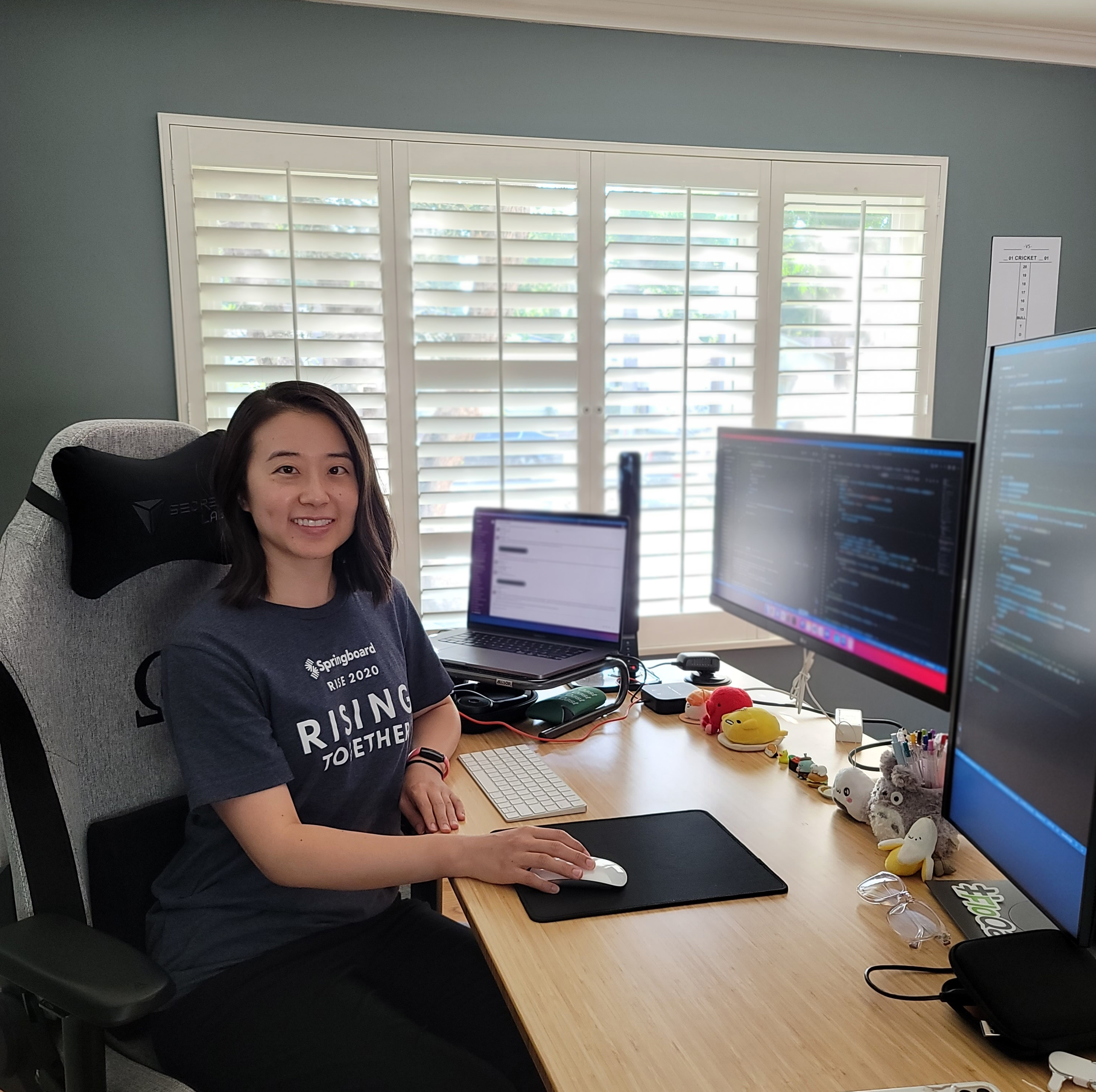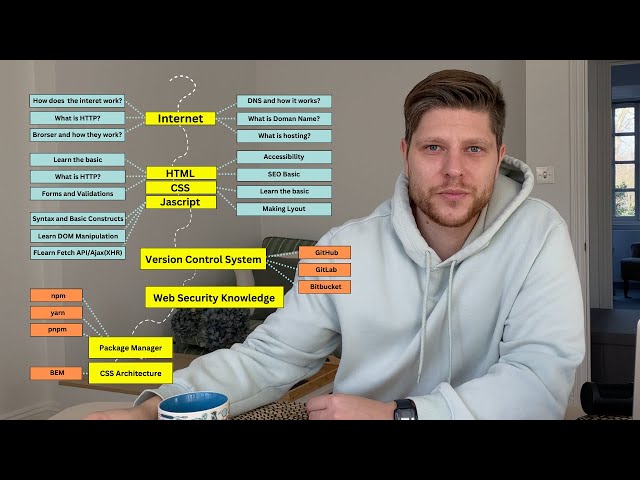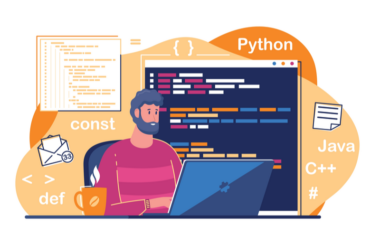How To Become a Front-End Developer in 2023 [Career Guide]
![How to Become a Front-End Developer in 2023 [Career Guide]](jpg/how-to-become-a-front-end-developer-in-2023-career-guide-800x526.jpg)
In this article
- Is It Hard To Become a Front-End Developer?
- What Does a Front-End Developer Do?
- How To Become a Front-End Developer: A Nine-Step Guide
- General Prerequisites To Become a Front-End Developer
- Becoming a Front-End Developer: Real-Life Examples To Learn From
- How Much Can You Earn as a Front-End Developer?
- How To Become a Front-End Developer FAQs
What’s the difference between an intuitive and a horrendous digital experience? Oftentimes, it’s a matter of front-end development. Front-end developers build the customer-facing side of apps and websites, making them easy (or impossible when things go wrong) to navigate and find the information you’re looking for.
Given that we all spend an increasing amount of time in front of screens, it’s no surprise that front-end developers are increasingly in demand. Right now, there are about 16,000 open front-end development positions listed on LinkedIn. And the number of available openings is only expected to grow. In the next ten years, the US Bureau of Labor Statistics projects that the number of openings for front-end developers is going to increase by 23%.
Want to fill one of those positions? Then you’re in the right place. Below, we’ll tell you everything you need to know about how to acquire front-end developer skills, and how to land the developer job of your dreams.
Is It Hard To Become a Front-End Developer?
Because front-end development learning resources are readily available, it’s never been easier to become a front-end developer—anyone with a computer can work on their own projects. It also helps that companies don’t require that you have a four-year degree and that bootcamp graduates and self-taught developers regularly land coveted front-end developer roles.
What Does a Front-End Developer Do?
The front-end of a website or app is the part that the users see and interact with. That’s why it’s called client-side development at times. Back-end developers build the parts you don’t see, such as the database and servers. The job of a front-end developer involves designing and developing the elements that users see. They decide how a website should be laid out, how users navigate it, and how images, text, and animations should combine to convey a particular message.
How To Become a Front-End Developer: A Nine-Step Guide
Follow these nine steps to land a coveted front-end development job:
-
Pursue the Necessary Education
-
Learn To Code
-
Learn Version Control Systems
-
Participate in Coding Challenges
-
Explore Open-Source, Freelance, or Volunteer Projects To Build Your Portfolio
-
Hone Your Skills
-
Network
-
Pursue a Front-End Development Internship
-
Polish Your Resume and Prepare for Interviews
Pursue the Necessary Education

You need to lay a foundation for growth in the front-end development career track with an education in the area. Here are a few ways you can do that:
Bachelor’s Degree
The conventional route to a job in front-end development goes through a college degree. It’s the most intensive mode of education you can take to land a job in this space.
There are a few different kinds of degrees that you can get that are relevant to front-end development. A bachelor’s degree in computer science will give you a very broad set of skills, covering programming languages, computation theory, and relevant mathematical concepts. It’s a great base to have going into a job in front-end development.
You also have the option of doing a degree in design. Courses in areas like UX design, graphic design, and interaction design all provide students with skills that come in handy when they’re looking to work as a front-end developer. But you will need to do some extra work to complement your design skills with the additional skills in programming required to work in a development role.
Bootcamp
Bootcamps have revolutionized the ways in which front-end development is taught and learned today, as they provide a learning path that’s more tailored than what traditional universities can offer. They also place special emphasis on landing a job and ensure that you walk away with projects that look good on your portfolio.
If you want to become a front-end developer, then you should definitely consider a front-end development bootcamp. The benefit of a bootcamp is that you can easily find one that caters to your needs, whether that’s one that has weekend classes or lets you attend classes online.
Self-Taught Route
If you’re good at learning things on your own, then the Internet is your playground. There’s everything from free online coding classes to web design online courses to YouTube content that will teach you entire front-end programming languages from scratch.
The self-taught mode is great because you get to go at your own pace and select the exact topics that you’re interested in. But it also means that you don’t get personalized help and have to produce your own motivation to stay on your learning journey.
Learn To Code

There are a few programming languages that every front-end developer should know. They’re commonly used in the industry, and you’ll likely have to answer questions about them in interviews. These include:
HTML
Hypertext Markup Language (HTML) is the skeleton of the Internet. Front-end developers use HTML to tell Internet browsers how websites should be rendered on a screen. You should be well-versed in constructing layouts and know what all of the commonly used HTML tags do.
CSS
CSS stands for Cascading Style Sheets. Where HTML positions elements on a page, CSS is used to style those elements. Anything that has to do with fonts, text size and color, images, and so on is written in CSS. Once you know basic CSS, you should move on to studying CSS frameworks like Bootstrap and Tailwind because they can boost your productivity and help you produce better work as a CSS designer.
Javascript
Javascript is the language that adds dynamism to web pages. It can be used to add visual dynamism through animations. But it also adds functional dynamism by connecting front-end elements to the backend and database.
Related Read: 12 Best JavaScript Courses To Boost Your Skills
Learn Version Control Systems
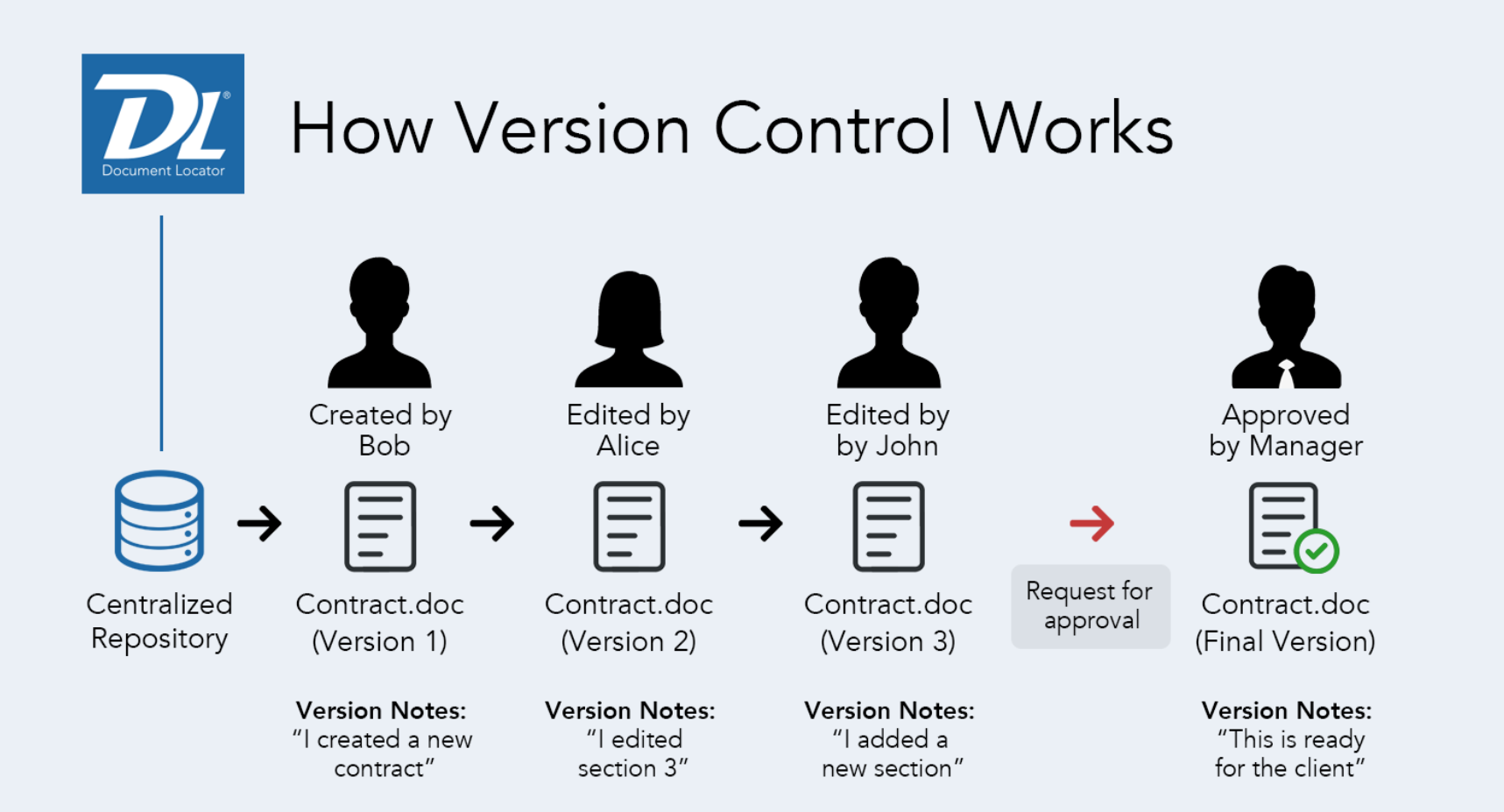
Version control is, quite simply, the practice of maintaining a record of all of the different versions of the programs that you’ve written. This is important because it becomes easy to track back to a previous version in case a program breaks or you want to retrieve a piece of code that you deleted unintentionally.
Git is the most popular version control system in the software industry at the moment. Front-end developers use Git as a version control system primarily. But it can also serve as a public repository for your code libraries and something that you can point recruiters to as proof of your work.
Participate in Coding Challenges
Coding challenges can be a great way to test your skills and accelerate your learning in a competitive environment, and there are a whole host of platforms that host coding challenges online. You should start participating in these challenges once you have foundational front-end development skills.
Explore Open-Source, Freelance, or Volunteer Projects To Build Your Portfolio
If you want to land a front-end developer job, then you’re going to need a portfolio to showcase your work. There are a few different ways that you can go about making that happen. The first is by contributing to open-source projects. This is the most accessible way to get started because you’re only contributing to existing code and aren’t responsible for the entire project yourself.
Another way to work on projects is through volunteering. You can approach local small businesses and nonprofits with the offer of volunteering as a developer there. It may take some searching, but it can help your learning journey to work as a volunteer.
Finally, you can also freelance on real-world projects. If you have some education and experience under your belt, then you can go about looking for small-scale freelance projects which allow you to practice the things you’ve learned.
Hone Your Skills
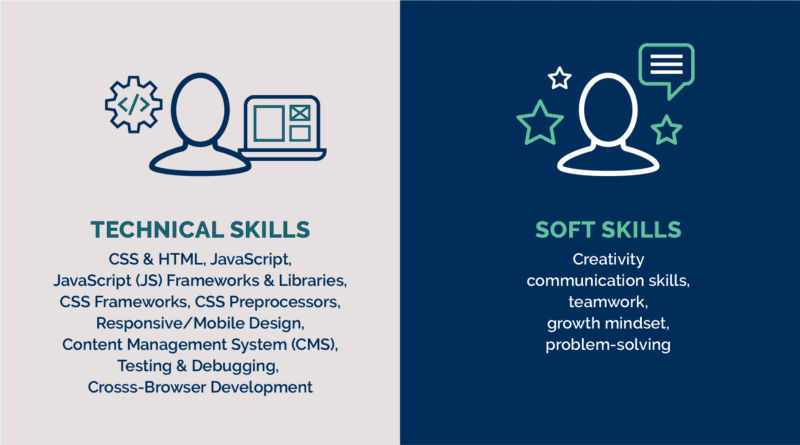
Front-end development is an area that’s constantly evolving. There are always new interface types and industry standards to keep track of. So you should regularly brush up on both your technical skills and soft skills so you can stay abreast of developments in the industry. These include:
Technical Skills
- Responsive design
- Version control
- Testing and debugging
- Web performance optimization
- CSS preprocessors
- Front-end development frameworks
Soft Skills
- Communication
- Teamwork
- Adaptability
- Problem-solving
Network
If the endpoint of your journey is to land a job as a front-end developer, then you’re going to need to network. Here are a few ways you can make that happen:
LinkedIn is a tool that gives you unparalleled reach and targeting capabilities. You can use it to find front-end developers already working at companies that you aspire to, recruiters, and tech industry managers. Once you connect with individuals in these areas, you can build relationships with them by interacting with their posts and then messaging them.
Online Communities
There are various online communities geared toward front-end developers. Users usually start off by viewing forum posts and commenting. You can take things forward by participating in community challenges and building relationships with the users you interact with regularly.
Conferences and Meet-Ups
Sometimes, good old face-to-face networking is the way to go. Front-end development conferences and meetups are a great way to meet a wide range of professionals across the industry. Conferences also allow you to attend talks and pick up new skills as you meet others passionate about front-end development.
Pursue a Front-End Development Internship

It isn’t always easy to go straight from college or a bootcamp to a front-end development job. Internships can be a good midway point where you get to learn how to apply your skills in a professional environment.
Most companies that hire front-end developers also have internship programs. You can search for internships online or reach out directly to HR departments to find out if a specific company is looking for interns.
A portfolio of personal front-end development projects can go a long way in helping you land an internship. You should have information on those projects up somewhere that recruiters can access it, which brings us to the next point.
Polish Your Resume and Prepare for Interviews
A good resume is essential to landing a job as a front-end developer. Make sure to look up successful programmers’ resumes for inspiration. Also, make sure to prepare for common coding interview questions in advance of your own interview.
Get To Know Other Software Engineering Students
Pritisha Kumar
Software Engineer at Dialpad
Alyssa Menes
Software Engineer at Progyny
Kristy Chu
Software Engineer at FloQast
General Prerequisites To Become a Front-End Developer
The following are the basic prerequisites to being able to land a job as a front-end developer.
Foundational Knowledge
This refers to all of the basic skills that front-end developers need to have. HTML and CSS are two languages that all web developers need to know regardless of what they do. You can do yourself a lot of good by moving on to Javascript, as it’s a powerful front-end development language. Finally, pick a front-end development framework like Backbone or Angular to supercharge your development process.
Education
A college degree in computer science or graphic design can help get your foot in the door at front-end development interviews. But nowadays, bootcamps tend to do a much better job of providing career support, and some even offer a job guarantee. What’s most important is that you pick the mode of education that fits your own style of learning and stick with it until you’re job ready.
Skills and Tools
Like any other trade, there are some front-end development tools that you’ll need to know. Codepen, for example, is often used by developers to collaborate on projects. And Bootstrap can help you develop stylesheets quickly and produce responsive designs.
Other Prerequisites
Here are a few other areas you should focus on as an aspirant in the front-end development field:
- Search engine optimization
- Graphic design applications like Photoshop, Illustrator, or Gimp
- Interpersonal skills to work in a team
- RESTful services and APIs
- Content Management Systems
Becoming a Front-End Developer: Real-Life Examples To Learn From

Here are a couple of real-life front-end developers who have documented their journey and provide invaluable insights on how you can land your dream job.
Syk Houdeib
Syk Houdeib is a great role model for those who aspire to enter the front-end development industry. He left a job in teaching and wrote his first program by following a programming book for children. He went on to land his first front-end developer job at a startup at the age of 40.
Marty336
Marty is a self-taught developer who went from novice to hired in a matter of six months. He shares a lot of practical advice for those who are hunting for jobs as self-taught developers. You can pick up some gems about crafting a strong resume, building a portfolio, and more by following his channel.
How Much Can You Earn as a Front-End Developer?
Here’s what you can expect to make at different stages of your front-end development career:
Entry-Level Front-End Developer
The salary of entry-level front-end developers in the US is $70,094.
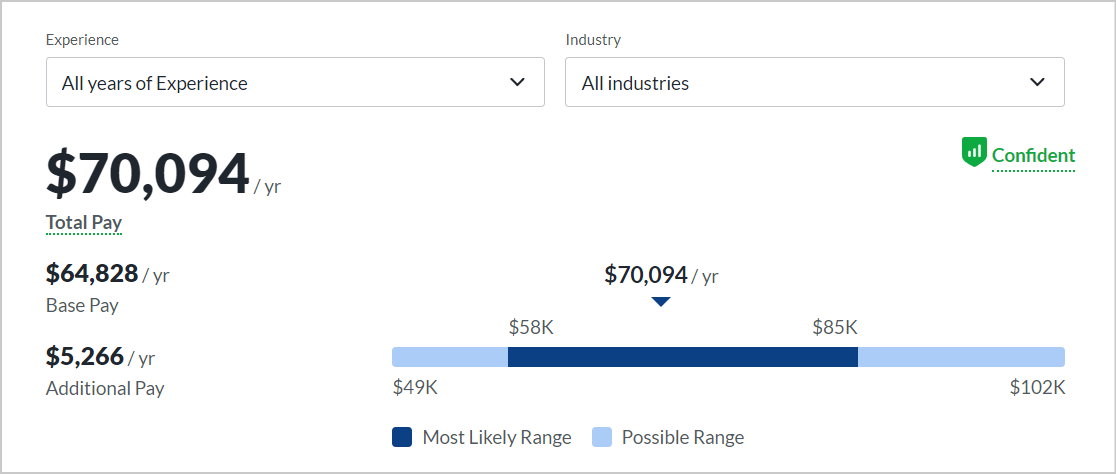
Mid-level Front-end Developer
According to the most up-to-date numbers, mid-level front-end developers have an average salary of $92,777 annually.
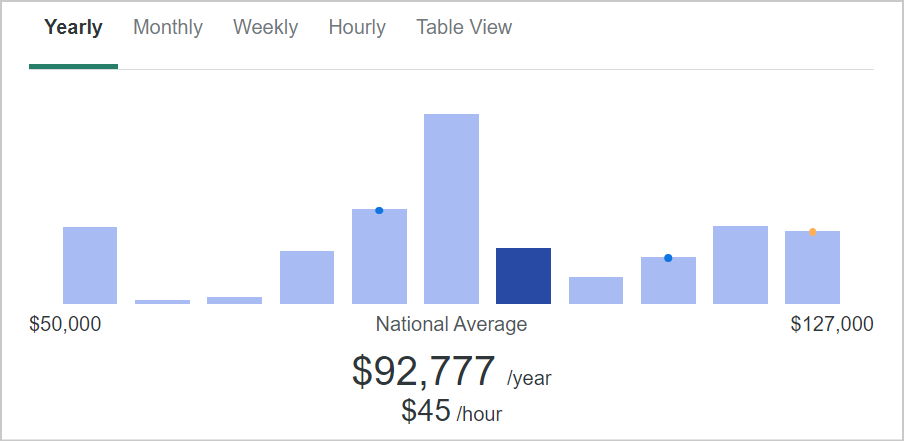
Senior Front-End Developer
Senior front-end developers have an average annual salary of $110,224.
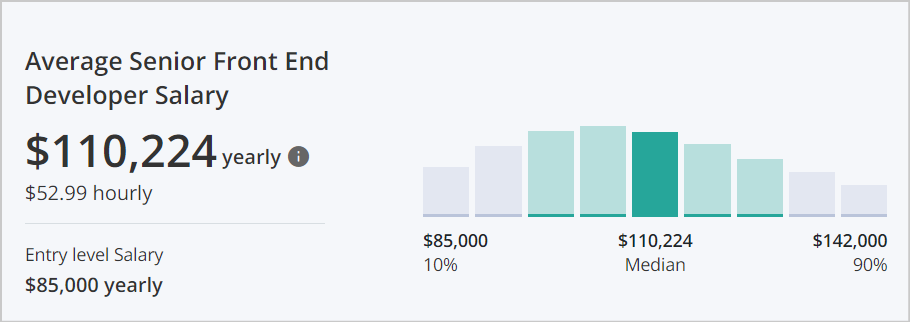
How To Become a Front-End Developer FAQs
We’ve got the answers to your most frequently asked questions:
Is Front-End Development a Good Career?
Front-end development is a great career choice for many reasons. It is a rewarding job role that allows professionals to work in exciting industries and cutting-edge projects in some cases. The job market will continue to be healthy for the foreseeable future. To add to that, it is also among the more lucrative careers out there.
Do You Need a Degree To Become a Front-End Developer?
You don’t necessarily need a degree to become a front-end developer. You can complete bootcamps or go down the self-taught route to gain the skills required for the job. From there on in, your portfolio and resume will determine your ability to land a gig. Most companies are open to hiring candidates even without a degree.
How Long Does It Take To Become a Front-End Developer?
Each individual’s learning journey is different. You should give yourself at least four to six months to wrap your head around basic front-end development tasks like building websites. You can then progress into more advanced areas like frameworks or preprocessors at your own pace.
Is Front-End Development the Right Career Choice for Me?
There are enough examples out there to show that anyone who puts their mind to it can become a front-end developer. If you feel like you have the itch, you should give it a shot. It helps that you can use low-investment means like free online courses and YouTube videos to find out whether you actually enjoy working on front-end development projects.
Since you’re here…
Interested in a career in software engineering? Join our mentor-led Software Engineering Bootcamp or our foundational Software Engineering Course if you’re just starting out. We help people make the switch every day (just peep our reviews). You can do it, too!


